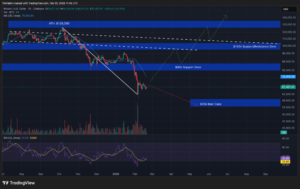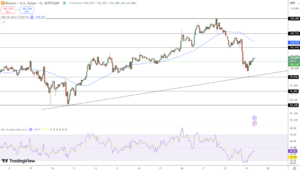Last updated:
 Why Trust Cryptonews
Why Trust Cryptonews
Ad Disclosure
We believe in full transparency with our readers. Some of our content includes affiliate links, and we may earn a commission through these partnerships.

In late November, CoinDesk, a leading crypto publication, published a story spotlighting blockchain billionaire Justin Sun’s latest headline-grabbing antics.
The article detailed how Sun consumed the $6.2 million banana he had purchased at a Sotheby’s auction. The banana was originally crafted by Maurizio Cattelan and titled as a “Comedian” art piece.
The report, titled “I Watched Justin Sun Eat the World’s Most Expensive Banana. I Don’t Get It,” explored the stunt’s context in the art world and included background on Sun, including his legal battle with the U.S. Securities and Exchange Commission (SEC).

The SEC has charged Sun with fraud, allegations that Sun and his blockchain company Tron have moved to dismiss.
Soon after publication, CoinDesk faced significant pressure.
According to sources cited in a Fortune report, Sun’s team complained about the tone of the article, leading CoinDesk’s parent company, the crypto exchange Bullish, to allegedly demand its removal.
The incident has grown in tensions between CoinDesk and its new owner, Bullish, which purchased the publication last year for $75 million.
These concerns about editorial independence follow Bullish’s assurances that CoinDesk would operate as an independent subsidiary.
However, Matt Murray, chair of CoinDesk’s editorial committee, resigned on December 16, and the Fortune report claims this has caused staff unease.
CoinDesk Vs. Justin Sun: What’s Bullish’s Stance?
Bullish, a crypto exchange led by former NYSE president Tom Farley, has ambitious plans, including a potential IPO next year.
Despite these plans, the controversy over the Justin Sun article has exposed potential conflicts between CoinDesk’s journalistic integrity and its business interests.
Sources suggest Sun’s team’s objections to the article extended beyond its tone. The article also discusses media coverage of Tron and its alleged connections to illicit finance.
Bullish’s acquisition of CoinDesk followed a challenging period for the publication’s previous owner, Digital Currency Group (DCG), which sold the outlet to strengthen its balance sheet.
Although Bullish paid $75 million, far less than the $200 million valuations initially anticipated, the purchase was seen as a strategic move to bolster the exchange’s media presence.
Since the acquisition, Bullish has emphasized its commitment to maintaining CoinDesk’s editorial independence.
However, incidents like removing the Justin Sun article have cast doubt on these promises.
The resignation of Matt Murray, chair of the editorial committee, further complicates the situation.
Justin Sun: A Polarizing Figure
Sun’s decision to eat the banana—a performance art piece designed to provoke dialogue about the intersection of art and commerce—was met with mixed reactions.
While Sun’s PR team framed the act as an homage to contemporary art, CoinDesk’s critics dismissed it as a publicity stunt.
Sun, known for his extravagant gestures such as paying $4.57 million to dine with Warren Buffett, has a history of courting attention.
However, the CoinDesk article also discussed his legal challenges and the SEC’s fraud allegations.
The original text, which has been removed but is still available on Yahoo News through a syndication agreement, evoked a mix of skepticism and curiosity.
It noted Sun’s penchant for theatricality while also delving into the broader implications of his actions within the art and crypto communities.
However, removing the piece has raised concerns about how sponsors can influence coverage, particularly when significant financial interests are at stake.
Tron is notably a major sponsor of CoinDesk’s Consensus conference series.
Per Fortune, CoinDesk’s journalists reportedly raised concerns over editorial independence during a recent newsroom meeting with Bullish CEO Tom Farley and CoinDesk CEO Sara Stratoberdha.
They called for the article to be reinstated with an editor’s note and sought reassurances about the integrity of future editorial decisions.
As of now, neither party has commented on any of Furtune’s claims.

















